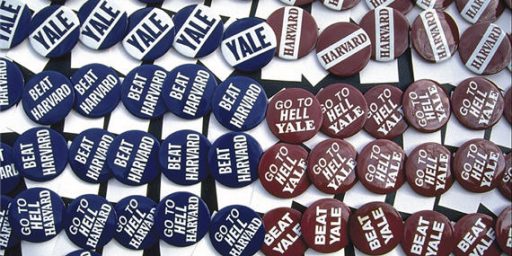Ed School Mafia
Dan Drezner, responding to a discussion on Eduwonk, reaffirms the conventional wisdom that graduate training in colleges of Education is among the least rigorous in the academy, an observation which comports with Matt Yglesias‘ anecdotal experience at Harvard. The three posts also have an interesting sideline discussion about the role of political ideology, especially that of the education bureaucracy, in low standards. The reader comments diverge into several tangents, notably the issue of teacher pay.
I’ve addressed most of these issues in previous posts, notably this one and then this discussion-filled trilogy (here, here, here).
The only thing new I would add is that the Dan, Matt, and Eduwonk are all talking about the elite schools and especially graduate programs at those institutions. Since the vast majority of schoolteachers go to open admission state universities and are disproportionately in the bottom quintile of the admission pool for those schools, the picture is actually far worse than they paint.






I’ll be against the normal thinking here – my 3rd grader does not need someone well versed in calculus, or even algebra for her math classes. She needs someone with a joy of teaching the subject, and who is capable of making change. But when she gets to High School, such knowledge is required. And hopefully well presented.
My problem with Education Schools is the whole concept of a PhD in Education. Self-licking Ice Cream Cone! Every school superindent must have this degree, as a union card.
Among my mother’s teacher friends there was a near-universal contempt for most of the education classes they were forced to take.
I agree with Rich that an elementary school teacher doesn’t need to know calculus to do the job, but the teacher doesn’t need to know most of what is learned in education classes either. The main problem for me is that it is a waste of an opportunity to get a real college education, whether that education suits the job or not.
You know, I have a couple of sayings I’ve heard along the way:
From a medical student: C=MD
From a law student: “A” students end up law professors, “B” students end up judges, and “C” students make all the money.
From an education major: All I need to be able to teach is a C.
Hate to say it, but they sound a lot alike.
Bill: True. But, then, a C in law school or med school ain’t the same as a C in an undergrad education class. A retarded chipmunk could get a B in one of the latter after pulling an all-nighter.
James –
I tend to agree with you, although I still think that part of the problem is the tendency of students to only do the minimum. “All I need to get is X” is a very common refrain across all disciplines. At the same time, when my fourth grade son comes home complaining that he knows more than the student teacher, I do think there’s a systemic problem as well.